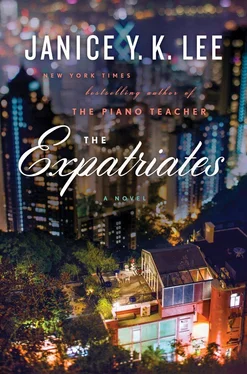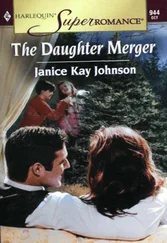For some reason, she didn’t bristle.
He joined her and her girlfriends afterward for dinner, at a small Italian restaurant on Madison Ave. They drank wine, and her girlfriends giggled, and the two of them knew that they were going to be together.
He was working at Procter & Gamble in New Jersey at the time, and they married and headed back to San Francisco, where they were both from, and she went back to school for landscape architecture, and Clarke got a job at M_ D_. They had Daisy, Philip, and G in quick succession, building their family.
When Daisy was nine, Clarke’s company approached him about a three-year rotation to Hong Kong, where he would oversee Asia Pacific, ex-Japan. It was a big promotion, and along with a substantial raise, they offered him a housing package, a car and driver, live-in maid, school fees for their three children, a country club membership, and two business class flights home a year for all of them. Later she would find that this was a standard package for senior executives, but it seemed dazzling at the time.
He came home with a big folder labeled FAMILY EXPATRIATION, which included a few paperback books written by women who had followed their husbands abroad. They called themselves “trailing spouses.” Their author photos were bright and cheery, showing them in front of the Forbidden City in Beijing or sitting in a tuk tuk in Bangkok. There was also a guidebook on Hong Kong and a twenty-page printout on the different neighborhoods, schooling options, medical care, and associations that women could join to integrate. There was a lot of talk about the “honeymoon period,” when one was busy setting up and settling in, and that one would be fine during this time. Then, after all that was finished, there would be a grief period, where one mourned the loss of one’s old life. They cautioned against living in the past, suggested that one canvass diligently for new friends and interests. Going to museums seemed to be a popular suggestion.
The entire thing gave Margaret hives. She was fine with moving to a different country, excited even, but the 1950s attitude toward women was frightening to her. Everyone seemed so earnest and cheery. It made her teeth hurt.
Her job was portable, of course, with the Internet and e-mail, and she had been doing fewer and fewer jobs anyway as the kids got older and needed more help with school. Maybe that portrayal hit a little too close to home.
She and Clarke flew to Hong Kong for a few days to house-hunt and get the lay of the land. The real estate agent, a young Chinese woman whose glasses steamed up in the humidity whenever she got out of the air-conditioned car, clutched a clipboard and had an earpiece permanently stuck in her ear. Her name was Rosacea. Margaret later discovered that the curious English names that locals gave themselves were cause for much merriment in the expat community. She and Clarke found themselves that first weekend at a dinner party where someone insisted that they had known a Pubic Ha and that their Rosacea was nothing special. Johnakin, Zeus, Tweety, Aids — everyone had encountered something stranger. One-upmanship was universal after all. There was a long and animated conversation about names that were one letter away from being ordinary, such as Jackon or Rimy (Jackson, Remy).
“It’s sort of a bastardization of an English name,” said one American woman.
“‘Bastardization’ seems a strong word,” Margaret said.
“You know what I mean,” said the woman impatiently.
Margaret looked around. Everyone was white, and they may have all been American, and even all from the left side of the country. She had thought that Hong Kong would be international and cosmopolitan, but she felt as if she were at a dinner party in any suburb in northern California.
She was dizzy with jet lag and sleepy from red wine, and the hostess, a nice woman from San Diego whose husband would work with Clarke, told her, when she was helping her pour the coffee, “We’ve all been there, honey. Trying to stay awake in front of the new boss or trying to look good for new friends. Be good to yourself.”
“Where are the Chinese people?” she wondered to Clarke later that night as they were getting ready for bed.
“What are you talking about?” his voice garbled as he brushed his teeth. “They’re everywhere!”
“But where was that place we were? Stanley? I felt like it was all white people. It could have been Marin County.”
He spit foam and laughed. “Look at you,” he said. “One day in Hong Kong and already you see the vast schism between white and Chinese here. What do you think you are?”
“You know what I mean,” she said.
The next day they got on the plane and flew home to rent out their house, decide what to take. Three months later, they landed back in Hong Kong and began their new life abroad as one more iteration of that species found throughout the farthest reaches of the world: the American expatriate.
It was exciting — this young family taking on the world. Daisy, at nine, was the most upset, but she handled the transition fine. G was just three, not old enough to know anything. Before they left, he would wake up every morning and ask, “Are we in Hong Kong?” She was so in love with him at that age. Two and three, the impossibly sweet ages, where they still smelled delicious, still nestled their head into your neck. They, the bright young family, moved to Hong Kong and started their bright new future.

Now she leaves her house. Just leaves. The power of that impulse. Just leave the children. Just leave the house. It will all be here when you come back. Things will roll on without you. Questions will be answered, repairmen admitted, homework somewhat finished. Just leave. Things will be the same. A thrilling idea. One she knows is not true.
She’s been saying she’s going to the gym but driving instead to her secret room. Her need to leave her house, her family, is growing. Before, she would steal away at nine in the morning, seeing all the kids off, Clarke to the office, but she wakes up and feels as if she cannot breathe, cannot possibly go through all the motions. So she says she has a 7:00 a.m. exercise class and escapes the house at 6:30, kissing warm, groggy children good-bye, making two cups of coffee, one for Clarke, one for herself in a stainless-steel travel flask, making sure the homework is in the backpacks and Essie knows what to pack in their lunchboxes.
She drives in the near-deserted streets and parks in a local lot, where the man knows her by now, waving her in. Margaret loves driving in the open, empty streets early in the morning, seeing the world slowly wake up. She sees both women and men in clothes from the night before, puffy-faced and abashed; industrious runners, sheened with perspiration; shopkeepers, rolling up their steel awnings. She thinks that anyone up at this hour is a saint or a scoundrel, or a little bit lost. She is removed, in her little car, driving, driving, driving, the steering wheel solid between her palms, her destiny so completely linked to her actions: If she moves right, she will be hit by a car; if she moves left, she will drive the car into the concrete wall. These certainties are what keep her grounded. She is in control here.
She goes to her apartment, and sometimes she reads a book or wanders through the Internet — she has begun bringing her laptop with her. She supposes she could just call it an office, but that doesn’t begin to describe what this place does for her.
It is a space of her own, just for her, where nothing from her real life need encroach.
This morning, though, she had waited. She had waited with her children at the bus stop in the cool December air. She had held their still-small hands in hers, feeling their frail bones. And they had let her, because they knew she needed it. The preschool buses really get to her. They rumble up the hill, filled with small children and their small, curious faces. On one bus this morning, a little girl had stared out, her blank face painted white and black like a dog, framed in the window. Like a moment out of a surrealist film. Then the bus rumbled past, and the girl with the face paint was gone, vanished. These are the moments that fill her with a temporary, bittersweet gratitude, that she is here, on this gray sidewalk, with her children by her side, an empty day stretched out before her after they have gone to their respective classrooms with their respective teachers, the temperate blue sky above dotted with floating clouds. And her fear that it will all go away, again.
Читать дальше













